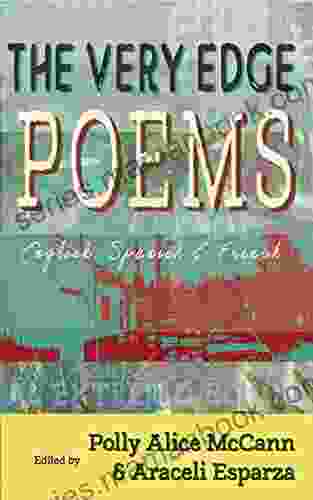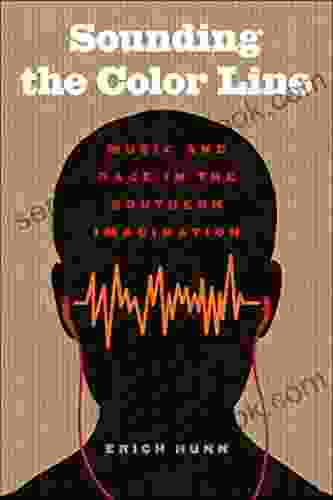Sounding the Color Line: Exploring the Complexities of Race, Music, and Identity in America

Music has always played a vital role in American society, providing a soundtrack to our collective experiences and shaping our understanding of ourselves and the world around us. However, the relationship between race, music, and identity in America has been anything but simple. Throughout history, music has both reinforced and challenged racial boundaries, reflecting the complex and often contradictory ways in which we have grappled with issues of race and equality.
5 out of 5
| Language | : | English |
| File size | : | 3850 KB |
| Text-to-Speech | : | Enabled |
| Screen Reader | : | Supported |
| Enhanced typesetting | : | Enabled |
| Word Wise | : | Enabled |
| Print length | : | 229 pages |
The Early Years: Music as a Dividing Force
Music was one of the earliest and most visible ways in which racial distinctions were drawn in America. In the antebellum South, for example, slaves were forbidden from singing or playing instruments that might be associated with white culture. Instead, they were encouraged to create their own unique forms of music, such as spirituals and work songs, which often expressed their hopes, dreams, and struggles.
After the Civil War, racial segregation continued to shape the musical landscape of America. Black musicians were relegated to performing in their own venues, and they were often denied the opportunity to record or perform on mainstream radio stations. As a result, black music developed its own distinct sound and style, which would later influence the development of genres such as blues, jazz, and rock and roll.
The Civil Rights Movement: Music as a Unifying Force
The Civil Rights Movement of the 1950s and 1960s brought about a new era of social and political activism, and music played a key role in this movement. Songs such as "We Shall Overcome" and "Mississippi Goddam" became anthems of the movement, inspiring people to fight for equality and justice. Black musicians such as James Brown, Nina Simone, and Bob Marley used their music to raise awareness of the plight of black Americans and to call for change.
The Civil Rights Movement also helped to break down some of the barriers that had previously separated black and white music. Black musicians began to appear on mainstream radio stations and television shows, and they began to collaborate with white musicians on a more regular basis. This cross-pollination of musical styles helped to create new and innovative sounds, and it helped to pave the way for the integration of American music.
The Post-Civil Rights Era: Music as a Reflection of Diversity
In the decades following the Civil Rights Movement, America became increasingly diverse, and this diversity was reflected in the music that was being produced. Black musicians continued to explore new genres, such as funk, soul, and hip hop, while white musicians began to incorporate elements of black music into their own work. The result was a vibrant and eclectic musical landscape that celebrated the diversity of American culture.
However, the post-Civil Rights Era also saw the rise of new forms of racial division. The backlash against the Civil Rights Movement led to the emergence of white supremacist groups, and these groups often used music to spread their message of hate and intolerance. In response, black musicians began to use their music to speak out against racism and to promote unity and understanding.
The relationship between race, music, and identity in America is a complex and ever-evolving one. Throughout history, music has both reinforced and challenged racial boundaries, reflecting the complex and often contradictory ways in which we have grappled with issues of race and equality. Today, music continues to play a vital role in shaping our understanding of ourselves and the world around us, and it remains a powerful force for change.
By exploring the rich and varied history of American music, we can gain a deeper understanding of the complex relationship between race, music, and identity. We can also learn from the ways in which music has been used to both divide and unite people, and we can use this knowledge to create a more just and equitable world.
5 out of 5
| Language | : | English |
| File size | : | 3850 KB |
| Text-to-Speech | : | Enabled |
| Screen Reader | : | Supported |
| Enhanced typesetting | : | Enabled |
| Word Wise | : | Enabled |
| Print length | : | 229 pages |
Do you want to contribute by writing guest posts on this blog?
Please contact us and send us a resume of previous articles that you have written.
 Top Book
Top Book Novel
Novel Fiction
Fiction Nonfiction
Nonfiction Literature
Literature Paperback
Paperback Hardcover
Hardcover E-book
E-book Audiobook
Audiobook Bestseller
Bestseller Classic
Classic Mystery
Mystery Thriller
Thriller Romance
Romance Fantasy
Fantasy Science Fiction
Science Fiction Biography
Biography Memoir
Memoir Autobiography
Autobiography Poetry
Poetry Drama
Drama Historical Fiction
Historical Fiction Self-help
Self-help Young Adult
Young Adult Childrens Books
Childrens Books Graphic Novel
Graphic Novel Anthology
Anthology Series
Series Encyclopedia
Encyclopedia Reference
Reference Guidebook
Guidebook Textbook
Textbook Workbook
Workbook Journal
Journal Diary
Diary Manuscript
Manuscript Folio
Folio Pulp Fiction
Pulp Fiction Short Stories
Short Stories Fairy Tales
Fairy Tales Fables
Fables Mythology
Mythology Philosophy
Philosophy Religion
Religion Spirituality
Spirituality Essays
Essays Critique
Critique Commentary
Commentary Glossary
Glossary Bibliography
Bibliography Index
Index Table of Contents
Table of Contents Preface
Preface Introduction
Introduction Foreword
Foreword Afterword
Afterword Appendices
Appendices Annotations
Annotations Footnotes
Footnotes Epilogue
Epilogue Prologue
Prologue Leonard A Batterson
Leonard A Batterson Todd S Hawley
Todd S Hawley Alice Oseman
Alice Oseman James R Cowdery
James R Cowdery Melissa Yuan Innes
Melissa Yuan Innes Lavanya Karthik
Lavanya Karthik Dusty Richards
Dusty Richards Berndt Sundsten
Berndt Sundsten Tanya Shirley
Tanya Shirley Gladys Yang
Gladys Yang Nikhil Abraham
Nikhil Abraham Erica Katz
Erica Katz Lee Jenkins
Lee Jenkins Bruce Goldfarb
Bruce Goldfarb Alice Currah
Alice Currah Edmund Blunden
Edmund Blunden Simon Warwick Beresford
Simon Warwick Beresford Anna Stephens
Anna Stephens Erich Nunn
Erich Nunn John Troughton
John Troughton
Light bulbAdvertise smarter! Our strategic ad space ensures maximum exposure. Reserve your spot today!

 Hamilton BellThe Best of Dennis Alexander: A Comprehensive Guide to the Renowned Artist's...
Hamilton BellThe Best of Dennis Alexander: A Comprehensive Guide to the Renowned Artist's... Tennessee WilliamsFollow ·11.6k
Tennessee WilliamsFollow ·11.6k Stanley BellFollow ·8.6k
Stanley BellFollow ·8.6k Elliott CarterFollow ·10k
Elliott CarterFollow ·10k Ira CoxFollow ·8.6k
Ira CoxFollow ·8.6k Dan BrownFollow ·3.9k
Dan BrownFollow ·3.9k Jamie BellFollow ·9.5k
Jamie BellFollow ·9.5k Cormac McCarthyFollow ·13.2k
Cormac McCarthyFollow ·13.2k Chase MorrisFollow ·6.3k
Chase MorrisFollow ·6.3k

 David Mitchell
David MitchellMy Surly Heart: Poetic Expressions of Unrequited Love...
In the annals of...

 Jake Carter
Jake CarterBleach Vol. 50: The Six Fullbringers - A Comprehensive...
Bleach Vol. 50, titled "The Six...

 Edward Reed
Edward ReedThe Art of Simple Food II: A Masterclass in Culinary...
In an era of culinary excess, where meals...

 Jarrett Blair
Jarrett BlairThe Easy Ingredient Ketogenic Diet Cookbook: Your Gateway...
The ketogenic diet,...

 Larry Reed
Larry ReedThe Very Edge Poems Polly Alice Mccann: A Poetic...
An to 'The Very...

 Sidney Cox
Sidney CoxThe Keys of Death and Hades: Unlocking the Epic of...
In the realm of mythology...
5 out of 5
| Language | : | English |
| File size | : | 3850 KB |
| Text-to-Speech | : | Enabled |
| Screen Reader | : | Supported |
| Enhanced typesetting | : | Enabled |
| Word Wise | : | Enabled |
| Print length | : | 229 pages |










